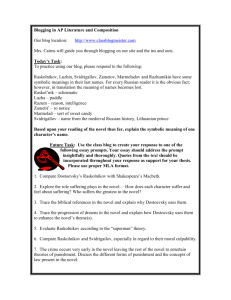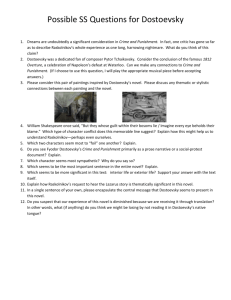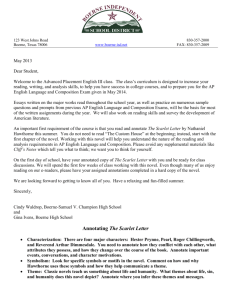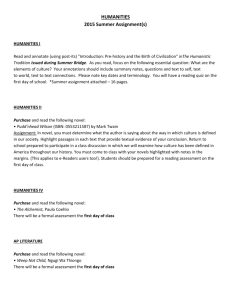AP Literature Summer Reading Letter
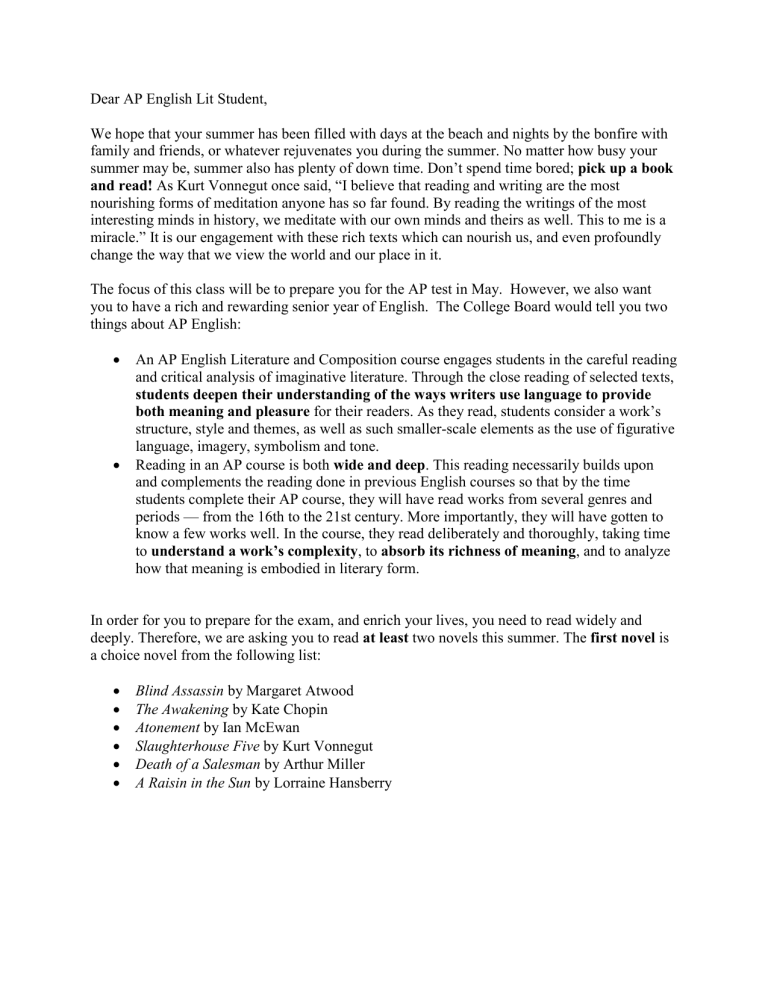
Dear AP English Lit Student,
We hope that your summer has been filled with days at the beach and nights by the bonfire with family and friends, or whatever rejuvenates you during the summer. No matter how busy your summer may be, summer also has plenty of down time. Don’t spend time bored; pick up a book and read!
As Kurt Vonnegut once said, “I believe that reading and writing are the most nourishing forms of meditation anyone has so far found. By reading the writings of the most interesting minds in history, we meditate with our own minds and theirs as well. This to me is a miracle.” It is our engagement with these rich texts which can nourish us, and even profoundly change the way that we view the world and our place in it.
The focus of this class will be to prepare you for the AP test in May. However, we also want you to have a rich and rewarding senior year of English. The College Board would tell you two things about AP English:
An AP English Literature and Composition course engages students in the careful reading and critical analysis of imaginative literature. Through the close reading of selected texts, students deepen their understanding of the ways writers use language to provide both meaning and pleasure for their readers. As they read, students consider a work’s structure, style and themes, as well as such smaller-scale elements as the use of figurative language, imagery, symbolism and tone.
Reading in an AP course is both wide and deep . This reading necessarily builds upon and complements the reading done in previous English courses so that by the time students complete their AP course, they will have read works from several genres and periods — from the 16th to the 21st century. More importantly, they will have gotten to know a few works well. In the course, they read deliberately and thoroughly, taking time to understand a work’s complexity
, to absorb its richness of meaning , and to analyze how that meaning is embodied in literary form.
In order for you to prepare for the exam, and enrich your lives, you need to read widely and deeply. Therefore, we are asking you to read at least two novels this summer. The first novel is a choice novel from the following list:
Blind Assassin by Margaret Atwood
The Awakening by Kate Chopin
Atonement by Ian McEwan
Slaughterhouse Five by Kurt Vonnegut
Death of a Salesman by Arthur Miller
A Raisin in the Sun by Lorraine Hansberry
1.
Choice Book
We recommend that you read your choice book first, in the first half of the summer.
While you read, we want you to be paying attention to the two key ideas presented by the College
Board:
1) How is the author creating meaning through language, structure, point-of-view, etc.?
2) What “richness of meaning” are you taking from the work? What does the novel make you consider deeply?
You don’t need to annotate this text, but we do want you to highlight or tab or dog-ear key passages that you found well-written or that presented an idea that is still bouncing around in your brain and making you think.
Writing Task for Choice Book
You need to write a 2-3 page response (12 pt Times New Roman, normal spacing) to 1-2 of the passages that made you think. You should address questions 1 & 2 above in your response. This is not a “traditional” literary analysis or argument paper, but a dialogue with the text. In the AP folder in the shared drive I have included a short passage from Richard Ford’s The Sportswriter and then a response from me that can serve as a model for your response. You should not be turning to Cliff’s Notes or any Internet sources—we do not care what other people think about the book, we care about how you engage with the text!
2.
Crime and Punishment, Parts I-III
You need to have read the foreward and parts I-III (pages 3-278) of Crime and Punishment for the beginning of class. We will begin the year discussing this important novel. You need to annotate this novel. Annotate means both underlining key phrases and jotting down notes and observations in the margins.
Focus on the basics—characterization, setting, and how Dostoevsky uses specific details to develop Raskolnikov’s split personality.
Pay attention to how Dostoevsky uses the third person point of view and yet at the same time the reader is often inside Raskolnikov’s head.
Lastly, you should always annotate and write in the margins when there are sections that confuse you or that you do not understand.
In a separate document , we have included a lot of study guide questions for each part of the novel. Why you are not required to write out answers to these questions , we highly recommend that you read the questions and keep them near you as you read the text, as the questions will inform your reading and your ability to annotate. These are questions that we expect that you can answer when we begin discussing the novel.
Writing Task for Crime and Punishment
You must choose three of the following journal entries and respond fully and thoughtfully—at least 1 page, normal spacing, for each. Choose the topics that interest you the most.
1) Rank the following people according to the immorality of their behavior. Then provide your rationale and your criteria for this judgment. thief prostitute murderer gossip sadist alcoholic gambler
2) Altruism means an unselfish regard for the welfare of others. An altruist makes choices that will benefit others, even if those choices are harmful to him- or herself. People who risk their lives to save others may be considered altruistic—or perhaps foolish. Consider the following people as a hero or as a fool and explain your reasoning.
Religious martyr
Soldier who falls on a grenade to save his company
Fireman who rushes into a burning building to save a child
Fireman who rushes into a burning building to save a child but perishes in the attempt
Kamikaze pilot
Person who goes on a hunger strike to protest social injustice
An astronaut
Person who consents to being the object of experiments to find a cure for a disease
Person who does not cheat on a test when the teacher leaves the room and the rest of the class cheats
3) Judge Sonya’s decision to become a prostitute to help her family. Would you prostitute yourself for your family? What about Dunya’s decision to marry Luzhin. Is her choice the same as Sonya’s? Has she prostituted herself? Would you marry someone much older than you for money if you thought your family needed it?
4) How would you define suffering? Be as specific as you can.
5) “Hm… yes… man has it all in his hands, and it all slips through his fingers from sheer cowardice… That is an axiom… I wonder, what are people most afraid of? A new step, their own new world, that’s what they’re most afraid of… I babble too much, however”(4).
What does Raskolnikov say that most people are afraid of, and what do you think he means?
What are you most afraid of?
6) Do you—brighter than average, high-performing students—believe that some people are simply superior to others? Is it egotistical to regard oneself as highly intelligent? Is it hubris to aim high even though you know you can achieve greatness? Consider how you feel about tracking (college prep v. honors, class ranking and so forth). Isn’t it false humility to not let others know that you understand complex ideas that sail over most people’s heads?
7) The question is at the end, but a little background info first
!
Georg Wilhelm Friedrich Hegel (1770-1831)
Hegel was one of the founders of German idealism and was widely influential among writers such as Nietzsche and Kierkegaard. His superman philosophy resembles that of Brutus, who killed Caesar “for the good of Rome.” The Hegelian superman exists for noble purposes. If the ends are noble, then the means can be justified. Hegel’s superman is one who stands above the ordinary man but works for the benefit of all mankind.
Friedrich Wilhelm Nietzsche (1844-1900)
Nietzsche was a 19 th
century German philosopher whose most important ideas are frequently simplified as nihilism, the death of God and the idea of the Übermensch . Unlike Hegel’s superman who works for the good of mankind, Nietzsche’s Übermensch exists for his own personal satisfaction. His actions are not prompted by noble goals. The Nietzsche superman is the one who possesses the strongest will and is able to make his desires and his power dominant over others. The superman refuses to recognize any will beyond that of his own. He asserts his own will in order to gratify his own desires. This type of superman must stand completely alone and must not allow his will to be influenced by the wishes of others. His will alienates him from society.
German thug: “Ve are nihilists. Ve belief in nothing.”
Dude: “That must be exhausting.”
From The Big Lebowski
So, the nihilist finds life absurd, God dead and people unalterably self-centered. What could
Raskolnikov find appealing about this philosophy? What could ANYONE find appealing about this philosophy?
